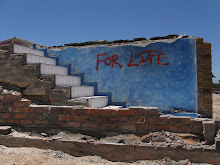If you had found me asleep on the floor of a practice room in the basement of the South African College of Music today, you might have felt pity for me. Indeed, I was exhausted. I had spent the night in a vigil. I had kept watch until I was certain that things were safe, until I could see Table Mountain in the sun’s light, and until another light had also risen in the corner of the sky. But once I saw that light, I was in no need of pity.
The election was called at 6:00 am here. I was at Café Sofia’s on Main Road, with some fifty or sixty others – mostly, but not entirely, Americans. The screams were deafening, and their intensity was matched by the squeeze of hugs from strangers. Tears of joy were shed. Some were even hysterical.
Joy (the person) and I stepped out into the morning light and started for home. We found it difficult to contain ourselves, and announced the news to strangers on the street. I only had a couple of hours to sleep before I had to accompany a fellow student for a practical exam. On the way to the college I passed Christopher, the security guard. He asked me if things would really be different from now on.
For many of us, Africans and Americans alike, this election has played to our archetypal notion of the hero, who slays the dragon and earns dominion over the kingdom. This, combined with a vision of an America that is no longer a global parasite, inspires a new sense of patriotism in many Americans to whom that word has had negative connotations for at least eight years.
We elected our new leader because he promised change, but as he reminded us in his speech, we can’t just vote change into office. We must be the change. This spirit, this energy, this hysteria – let it not be an ephemeral flame, only to be put out when we are reminded of the cold complications of reality. Though we may now see the stars and stripes in a warmer light, patriotism will be no easier in practice.
The time could not be riper for us to examine what the practice of patriotism means. For me, especially since I have been here, patriotism means seeing my country in a global context. One of the most stark realities that we face when we look at this picture is that , in our use of resources and production of waste, we are enforcing the inequality which we ideologically condemn. Our citizens simply have more available to them, and have developed a culture where the unsustainable use of resources is a norm. Unsustainable means that the remaining global resources are suffering because of it, but our citizens also largely have the power to isolate themselves from the consequences. So the burden is left on the shoulders of the economically weaker nations. For these nations, this is what the American flag symbolizes.
Culture is not an easy thing to change. Change comes with the inspiration of an event of mythological significance, and charismatic leaders to sustain that inspiration. In other words, the logs are stacked and the kindling is lit. It is up to us to fan the flame.
Wednesday, November 5, 2008
Subscribe to:
Post Comments (Atom)

No comments:
Post a Comment